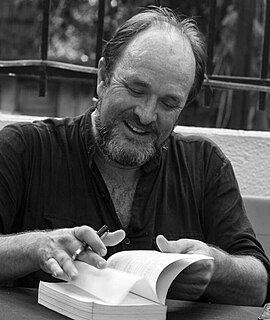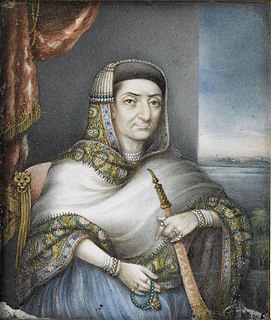Related Research Articles

According to consensus in modern genetics, anatomically modern humans first arrived on the Indian subcontinent from Africa between 73,000 and 55,000 years ago. However, the earliest known human remains in South Asia date to 30,000 years ago. Settled life, which involves the transition from foraging to farming and pastoralism, began in South Asia around 7,000 BCE. At the site of Mehrgarh presence can be documented of the domestication of wheat and barley, rapidly followed by that of goats, sheep, and cattle. By 4,500 BCE, settled life had spread more widely, and began to gradually evolve into the Indus Valley Civilization, an early civilization of the Old world, which was contemporaneous with Ancient Egypt and Mesopotamia. This civilisation flourished between 2,500 BCE and 1900 BCE in what today is Pakistan and north-western India, and was noted for its urban planning, baked brick houses, elaborate drainage, and water supply.

Hyderabad State, also known as Hyderabad Deccan, was a princely state located in the south-central Deccan region of India with its capital at the city of Hyderabad. It is now divided into the present-day state of Telangana, the Kalyana-Karnataka region of Karnataka, and the Marathwada region of Maharashtra in India.

Awadh, known in British historical texts as Avadh or Oudh, is a region and proposed state in the modern Indian state of Uttar Pradesh, which was before independence known as the United Provinces of Agra and Oudh. Awadh is bounded by the Ganges Doab to the southwest, Rohilkhand to the northwest, Nepal to the north, and Bhojpur-Purvanchal to the east. Its inhabitants are referred to as Awadhis.

The Indian Rebellion of 1857 was a major uprising in India in 1857–58 against the rule of the British East India Company, which functioned as a sovereign power on behalf of the British Crown. The rebellion began on 10 May 1857 in the form of a mutiny of sepoys of the company's army in the garrison town of Meerut, 40 mi (64 km) northeast of Delhi. It then erupted into other mutinies and civilian rebellions chiefly in the upper Gangetic plain and central India, though incidents of revolt also occurred farther north and east. The rebellion posed a considerable threat to British power in that region, and was contained only with the rebels' defeat in Gwalior on 20 June 1858. On 1 November 1858, the British granted amnesty to all rebels not involved in murder, though they did not declare the hostilities to have formally ended until 8 July 1859. Its name is contested, and it is variously described as the Sepoy Mutiny, the Indian Mutiny, the Great Rebellion, the Revolt of 1857, the Indian Insurrection, and the First War of Independence.

William Dalrymple is a Scottish historian, art historian and curator, as well as a broadcaster, critic and photographer. He is also one of the co-founders and co-directors of the world's largest writers festival, the annual Jaipur Literature Festival.

A lascar was a sailor or militiaman from the Indian Subcontinent, Southeast Asia, the Arab world, British Somaliland, or other land east of the Cape of Good Hope, who were employed on European ships from the 16th century until the middle of the 20th century.

Shuja-ud-Daulah was the Subedar and Nawab of Oudh and the Vizier of Delhi from 5 October 1754 to 26 January 1775.

Sake Dean Mahomed (1759–1851) was an Indian traveller, surgeon, entrepreneur, and one of the most notable early non-European immigrants to the Western World. Due to his foreign origin, his name is often spelled in various ways. His high social status meant that he adopted the honorific "Sake" (Sheikh) meaning "venerable one". Mahomed introduced Indian cuisine and shampoo baths to Europe, where he offered therapeutic massage. He was also the first Indian to publish a book in English.

The Red Fort or Lal Qila is a historic fort in Old Delhi, Delhi in India that served as the main residence of the Mughal Emperors. Emperor Shah Jahan commissioned construction of the Red Fort on 12 May 1638, when he decided to shift his capital from Agra to Delhi. Originally red and white, its design is credited to architect Ustad Ahmad Lahori, who also constructed the Taj Mahal. The fort represents the peak in Mughal architecture under Shah Jahan, and combines Persianate palace architecture with Indian traditions.

Medieval India refers to a long period of Post-classical history of the Indian subcontinent between the "ancient period" and "modern period". It is usually regarded as running approximately from the breakup of the Gupta Empire in the 6th century AD and the start of the Early modern period in 1526 with start of the Mughal Empire, although some historians regard it as both starting and finishing later than these points. The medieval period is itself subdivided into the Early medieval period and Late medieval era.

The Battle of Buxar was fought on 22 October 1764, between the forces under the command of the British East India Company, led by Hector Munro, and the combined armies of Mir Qasim, Nawab of Bengal till 1764; the Nawab of Awadh Shuja-ud-Daula; and the Mughal Emperor Shah Alam II. The battle was fought at Buxar, a "small fortified town" within the territory of Bihar, located on the banks of the Ganga river about 130 kilometres (81 mi) west of Patna; it was a decisive victory for the British East India Company. The war was brought to an end by the Treaty of Allahabad in 1765.

Joanna Nobilis Sombre, popularly known as Begum Samru, a convert Catholic Christian started her career as a nautch (dancing) girl in 18th century India, and eventually became the ruler of Sardhana, a small principality near Meerut. She was the head of a professionally trained mercenary army, inherited from her European mercenary husband, Walter Reinhardt Sombre. This mercenary army consisted of Europeans and Indians. She is also regarded as the only Catholic ruler in India, as she ruled the Principality of Sardhana in 18th- and 19th-century India.

The Mughal Empire, also spelled the Mogul or Moghul Empire, was an early modern Islamic empire in South Asia. For some two centuries, the empire stretched from the outer fringes of the Indus basin in the west, northern Afghanistan in the northwest, and Kashmir in the north Bangladesh in the east, and the uplands of the Deccan Plateau in South India.

David Ochterlony Dyce Sombre, also known as D. O. Dyce Sombre and David Dyce Sombre, was an Anglo-Indian held to be the first person of Asian descent to be elected to the British Parliament. He was elected to represent the Sudbury constituency in July 1841, but was removed in April 1842 due to bribery in the election. He was named after the British Resident at Delhi, David Ochterlony.
Frederick Villiers Meynell, known as Frederick Villiers during his political career, was a British Whig politician.
South Asians in the United Kingdom have been present in the country since the 17th century, with significant migration occurring in the mid-20th century. They originate primarily from eight sovereign states in South Asia which are, in alphabetical order, the countries of Afghanistan, Bangladesh, Bhutan, India, Nepal, Pakistan, and Sri Lanka. There is also a history of migration of diasporic South Asians from Africa and Southeast Asia moving to, and settling in, the United Kingdom.
South Asian people in Ireland are residents or citizens of Ireland who are of South Asian background or ancestry. There has been an important and well-established community of people of South Asian descent in Ireland since the eighteenth century. Non-Chinese Asian people were reported to be the fastest growing ethnic group in Ireland in the 2011 census.

James Copland (1791–1870) was a Scottish physician and prolific medical writer.

The Oudh State was a princely state in the Awadh region of North India until its annexation by the British in 1856. The name Oudh, now obsolete, was once the anglicized name of the state, also written historically as Oudhe.
Dirk Herbert Arnold Kolff is a Dutch historian and Indologist. Born at Rotterdam in the Netherlands, Kolff earned a doctorate degree from the Leiden University in 1983 with a doctoral thesis on the research subject of armed peasantry in northern India. He is a professor emeritus of modern South Asian history and the former Chair of Indian History at the Leiden University.
References
- ↑ "Fisher, Michael Herbert 1950-". WorldCat.
- 1 2 "Michael H. Fisher" . Gale Literature: Contemporary Authors. Gale. 2012. Retrieved December 20, 2021– via Gale in Context: Biography.
- 1 2 "Roswita Hoffman 'Roz' Fisher". The Blowing Rocket (Obituary). Blowing Rock, North Carolina. May 5, 2014.
- 1 2 3 4 "Michael H. Fisher CV" (PDF). Oberlin College.
- ↑ "Holdings: The Imperial Court and the Province: A Social and Administrative History of Pre-British Awadh (1775-1856)". The University of Chicago Library Catalog.
- ↑ Metcalf, Thomas R. (May 1989). "A Clash of Cultures: Awadh, the British, and the Mughals. by Michael H. Fisher". The Journal of Asian Studies (Review). 48 (2): 422–423. JSTOR 2057448.
- ↑ Ansari, Sarah (Winter 1989–1990). "A Clash of Cultures: Awadh, The British and the Mughals. by Michael H. Fisher". Pacific Affairs (Review). 62 (4): 565–566. JSTOR 2759696.
- ↑ Marks, Hara (April 13, 1990). "History department gets professor on Asia". The Oberlin Review. p. 2.
- ↑ "New Faces". The Observer. Oberlin, Ohio. August 30, 1990. p. 3.
- ↑ Leung, Adrian (February 14, 1997). "Lisa Crawford, Paula Richman, and Robert Shannon Are Honored with Endowed Professorships". The Observer. Oberlin, Ohio. p. 2.
- ↑ Marshall, P. J. (April 1995). "Indirect Rule in India. Residents and the Residency System, 1764-1858 by Michael H. Fisher". The English Historical Review (Review). 110 (436): 501–502. JSTOR 576108.
- ↑ MacKenzie, John M. (Spring 1995). "Indirect Rule in India: Residents and the Residency System, 1764-1858. By Michael H. Fisher". The Historian (Review). 57 (3): 621–622. doi:10.1111/j.1540-6563.1995.tb02022.x.
- ↑ Dalrymple, William (January 3, 1998). "An Indian with a triple first" . The Spectator. p. 23.
- ↑ Sattin, Anthony (September 28, 1997). "The Original Spice Boy". The Sunday Times. p. Books 10.
- ↑ Dale, Stephen F. (Summer 1999). "The Travels of Dean Mahomet. By Michael H. Fisher". The Historian (Review). 61 (4): 934–935. doi:10.1111/j.1540-6563.1995.tb02022.x.
- ↑ Sil, Narasingha P. (August 1999). "The Travels of Dean Mahomet: An Eighteenth-Century Journey through India by Michael H. Fisher". International Journal of Hindu Studies (Review). 3 (2): 205–206. JSTOR 20106654.
- ↑ Miller-Davenport, Sarah (September 22, 2000). "High Faculty Turnover Changes Face of Oberlin". The Oberlin Review. p. 3.
- ↑ Leung, Adrian (May 4, 2001). "History Prof. Resigns; Concerns Over Position Future". The Oberlin Review. p. 4.
- ↑ Laybourn, Keith (July 2008). "A South-Asian History of Britain: Four Centuries of Peoples from the Indian Subcontinent. By Michael H. Fisher, Shompa Lahiri and Shinder Thandi". History (Review). 93 (311): 444–445. doi:10.1111/j.1468-229X.2008.431_47.x. JSTOR 24428462.
- ↑ Robinson, Francis (February 2008). "Michael H. Fisher, Shompa Lahiri, and Shinder Thandi, A south-Asian history of Britain: four centuries of people from the Indian sub-continent". The Economic History Review (Review). 61 (1): 242–243. doi:10.1111/j.1468-0289.2007.00419_10.x. JSTOR 40057572.
- ↑ Dalrymple, William (August 1, 2010). "The Inordinately Strange Life of Dyce Sombre by Michael H Fisher". The Observer.
- ↑ Mukherjee, Sumita (Winter 2010). "The Inordinately Strange Life of Dyce Sombre: Victorian Anglo-Indian MP and Chancery 'Lunatic'". Journal of Colonialism & Colonial History (Review). 11 (3): 242–243. doi:10.1353/cch.2010.0013.
- 1 2 Miller, Edward (March 5, 2020). "Conservation Work Lags With Volunteer Shortage". The Provincetown Independent.
- ↑ "Obituaries". Cape Cod Times. July 6, 2000.
Doris (Richmond) Richman, 74, of Wellfleet, died Sunday ... Surviving besides her husband are a son ... and a daughter, Paula Richman of Oberlin, Ohio.
- ↑ Arnold, David (August 2020). "An Environmental History of India: From Earliest Times to the Twenty-First Century by Michael H. Fisher". The English Historical Review (Review). 135 (575): 1083–1084. doi:10.1093/ehr/ceaa180.